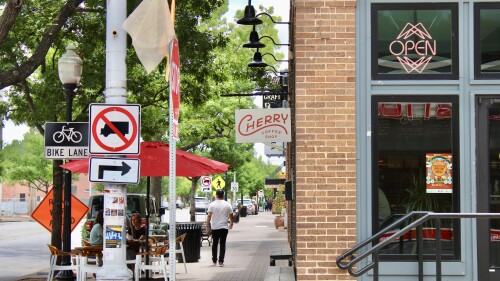The Trinity River will soon look like something out of a sci-fi movie with two giant waterwheels floating on either side. The goal? To turn the 3rd most polluted river in Texas into an oasis for water activities, wildlife + provide clean drinking water for residents.
About the Trinity River
The Trinity River is notorious for its pollution, with The Texas Department of Health calling it the “mythological river of death” in 1925. Dallas even used the river as drinking water but stopped because the pollution caused outbreaks of typhoid fever.
In 1991 the Texas Clean Rivers Act was passed, which mandated monitoring and reporting of water quality. Since then, Keep Fort Worth Beautiful has aimed to end littering, improve recycling, and beautify our communities.
How it will work
The City of Fort Worth, Tarrant Regional Water District + other community partners are investing in two solar-powered waterwheels to collect and remove floating trash. The river current will assist in turning the wheel and solar-powered pumps will lift trash into a detachable dumpster.
Benefits
- Collects trash and litter
- Improves aesthetics and usability
- Improves the aquatic ecosystems
- Uses solar power
- Inspires people to become part of the solution to end litter

The watersheels face upstream to catch trash floating down the river.
Image courtesy of Keep Fort Worth Beautiful
What will it look like
Designs for the waterwheels were completed in September 2022 and Keep Fort Worth Beautiful has moved on to the permitting phase of the project.
Set to be installed at the river’s Clear and West Forks, waterwheels and conveyor belts will be mounted on floating platforms. Containment booms — essentially a buoy line — will funnel trash onto the conveyor belt and into a detachable dumpster.
Approximately the size of a small building, the waterwheel measures 52 ft long by 24 ft wide with a 14-ft diameter wheel. The structure is covered with a protective material that keeps trash from being blown away by the wind. Solar panels will cover one side + help power the wheel.
Cost
Each wheel is expected to cost $600,000, but once the installation is complete, the city says the cost is minimal. Annual maintenance, which includes the disposal of collected wastes, system checks + annual system audits, is expected to cost about $50,000 per wheel.
How you can help
The city aims to fund both the construction and 10 years of maintenance through community donations and sponsorships + the city council has already accepted various private donations. Keep Fort Worth Beautiful is just one partner accepting donations — you can learn more about the initiative online.













